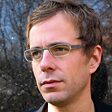Isolde Charim
Ich und die Anderen. Wie die neue Pluralisierung uns alle verändert
[Myself and the Others. How Modern Pluralization Changes Us All]
- Paul Zsolnay Verlag
- Wien 2018
- ISBN 978-3-552-05888-0
- 224 Pages
- Publisher’s contact details
Published in Greek with a grant from Litrix.de.
Sample translations
Welcome in the Encounter Zone
Today plurality is defined as a necessary proximity and coexistence of various cultures and religions, Nonetheless, for Charim, the fact is by no means evidence that a completely homogeneous culture was ever conceivable or desirable. Homogeneity has always been a construction, and the author follows Freud in criticizing the idea of anything being self-identical. Indeed, Freud's ego, which is "not the master in its own house," reveals the illusory nature of the presumption that an ego or by extension a society could ever be identical with itself. Despite that fact, for a long time, nationalism was an eminently successful attempt to maintain this illusion in grand style. And today? Wherever nationalism is reborn, for example, in the current omnipresent right-wing populism or the Brexit movement, invoking the nation only divides, never unites.
One might object that the the celebration of the plural, which conceives of the individual self-definition of the individual as traversing a spectrum of identification protected by mutual tolerance, always presupposes certain cultures and urban space, which had perennially by characterized by particular openness. Charim opposes this with th formulation "global village" and her own optimistic conclusion that today even rural space has urbanized: "Even in the village, that prototype of a homogenous way of life, there is pluralization. In every German or Austrian backwater, there is a kebab shop"
If we follow the author, today ubiquitously pluralized society is an "encounter zone" that profits from the precisely the fact that it no longer promises commonality. For that reason we must not only mistrust but resists all who put themselves upon the political stage with promises of re-homogenization and harmony – by that the author particularly means the far right, which has been strengthened everywhere.
Translated by Jefferson Chase

By Ronald Düker
Ronald Düker is a cultural scientist and author for the feature section of the newspaper DIE ZEIT. He lives in Berlin.
Publisher's Summary
Diversity changes everyone, whether we like it or not. The philosopher Isolde Charim describes what it means for the individual to live in a pluralized society.
We live in a pluralized society. Every culture stands in relation to others, no longer can we speak of a self-evident sense of belonging. Yet what is the meaning of- a pluralized society? And what does it mean for an individual to live in such a society? Viewed from the outside - things could always be different; we could believe something different, live differently. And this change affects everybody and all cultures. It also changes our relationship to the idea of community and the notion of our own identity. The philosopher Isolde Charim applies her thesis to various topics, from politics to integration, from the definition of the term home to the debates about religion.
(Text: Paul Zsolnay Verlag)
